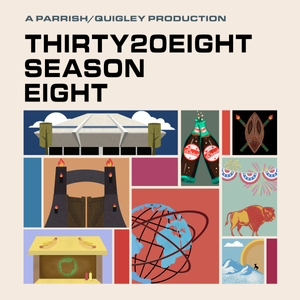
Growing Up in the 1930s
03/08/22 • 34 min
Season Two’s theme is “Growing Up in Coney Island” through the decades, from the 1930s to the 21st century. In Episode One, Coney Islanders who grew up in the ‘30s recall hardships as well as simple pleasures. During the Depression, families from other New York City neighborhoods flocked to Coney Island. The rent was cheaper and the beach was down the block.
The oral histories in Episode One are with George Ancona, Charles Berkman, Aldo Mancusi, Edith Storch, Rose Patton, and Ralph Perfetto. The interviews were conducted by Charles Denson, Mark Markov, Natalie Milbrodt, and Samira Tazari, between 2007 and 2018.
You can search and listen online to over 400 oral history interviews, including the ones featured in this podcast, at https://www.coneyislandhistory.org/oral-history-archive. This episode was produced by Charles Denson, Ali Lemer and Tricia Vita. Music by Blue Dot Sessions.
©2022 The Coney Island History Project. All Rights Reserved. This program is sponsored in part by an Action Grant from Humanities New York with funding from the National Endowment for the Humanities.
Season Two’s theme is “Growing Up in Coney Island” through the decades, from the 1930s to the 21st century. In Episode One, Coney Islanders who grew up in the ‘30s recall hardships as well as simple pleasures. During the Depression, families from other New York City neighborhoods flocked to Coney Island. The rent was cheaper and the beach was down the block.
The oral histories in Episode One are with George Ancona, Charles Berkman, Aldo Mancusi, Edith Storch, Rose Patton, and Ralph Perfetto. The interviews were conducted by Charles Denson, Mark Markov, Natalie Milbrodt, and Samira Tazari, between 2007 and 2018.
You can search and listen online to over 400 oral history interviews, including the ones featured in this podcast, at https://www.coneyislandhistory.org/oral-history-archive. This episode was produced by Charles Denson, Ali Lemer and Tricia Vita. Music by Blue Dot Sessions.
©2022 The Coney Island History Project. All Rights Reserved. This program is sponsored in part by an Action Grant from Humanities New York with funding from the National Endowment for the Humanities.
Previous Episode

Schools of Their Own
Episode 11 shares the stories of four dedicated and innovative teachers who founded schools of their own in Coney Island and adjacent neighborhoods in Southern Brooklyn. April Leong in the award-winning founder and principal of Liberation Diploma Plus High School, a small alternative high school in Coney Island. Dr. Tim Law established a program of free Chinese language classes for children at I.S. 96 Seth Low School in Bensonhurst. Irina Roizin realized her childhood dream of founding a ballet school, Brighton Ballet Theater School of Russian Ballet, located at Kingsborough Community College in Manhattan Beach. Misha Mokretsov is head coach and owner of Coney Island's New York Fencing Academy, located just down the block from the History Project.
This episode was produced by Charles Denson, Ali Lemer and Tricia Vita. Music by Blue Dot Sessions. Chinese translation by Keenan Yutai Chen. Voice overs by River Kanoff and Ali Lemer. The oral histories were conducted by Mark Markov, Samira Tazari, and Yolanda Zhang between 2015 and 2019. You can listen to the full interviews featured in this podcast in our oral history archive at coneyislandhistory.org.
Listen to previous episodes about Coney Island's legendary roller coasters, beach, bathhouses, and restaurants and other businesses on Mermaid Avenue and in the amusement area via your fave podcast app or the podcast page on the Coney Island History Project's website.
©2021 The Coney Island History Project. All Rights Reserved. This program is supported, in part, by funding from the New York City Department of Cultural Affairs in partnership with the City Council, and New York City Councilman Mark Treyger.
Next Episode

Growing Up in the 1940s
Season Two’s theme is “Growing Up in Coney Island” through the decades, from the 1930s to the 21st century. Episode Two, “Growing Up in the 1940s,” features the oral histories of Steve Burke, Sheila Levrant de Bretteville, Phil Einhorn, Deena Metzger, and Gloria Nicholson.
The 1940s started out with the Parachute Jump moving to Steeplechase Park from the New York World’s Fair. Aerial photos of packed beaches became emblematic of the era. When the U.S. entered World War 2, dim-out regulations darkened Coney’s skyline to prevent its lights from silhouetting ships offshore and making them a target for German U-boats. In the 1942 and ’43 Mardi Gras parades, servicemen were showered with confetti and lions from Luna Park riding by in their cage were advertised as ready to meet Hitler.
In Episode 2, Coney Islanders who grew up during the war years recall seeing gun emplacements on the boardwalk and soldiers camped in Kaiser Park. Their households had blackout curtains, ration coupons and victory gardens. Some had summer jobs in the amusement area despite being underage. After the war, their families took in relatives and boarders who were refugees and survivors of the concentration camps.
This episode was produced by Charles Denson, Ali Lemer and Tricia Vita. Music by Blue Dot Sessions. The oral histories were conducted by Charles Denson, Amanda Deutch and Samira Tazari between 2009 and 2018. You can search and listen online to over 400 oral history interviews, including the ones featured in this podcast, at coneyislandhistory.org.
©2022 The Coney Island History Project. All Rights Reserved. This program is sponsored in part by an Action Grant from Humanities New York with funding from the National Endowment for the Humanities.
If you like this episode you’ll love
Episode Comments
Generate a badge
Get a badge for your website that links back to this episode
<a href="https://goodpods.com/podcasts/coney-island-stories-295211/growing-up-in-the-1930s-38974343"> <img src="https://storage.googleapis.com/goodpods-images-bucket/badges/generic-badge-1.svg" alt="listen to growing up in the 1930s on goodpods" style="width: 225px" /> </a>
Copy




